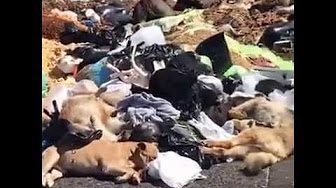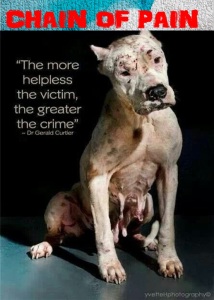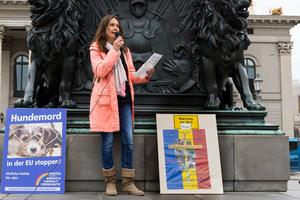Aufstand der Tiere | George Orwell | Politische Satire | Zeichentrickfilm | Drama – in vielen Sprachen vorhanden
spiritandanimaldotcom.wordpress.com
Aufstand der Tiere – Eine erfolgreiche Bauernhofrevolution der einheimischen Tiere gegen den Bauern geht schrecklich schief, als die Sieger eine neue Tyrannei unter sich schaffen. Aufstand der Tiere (1954) Regie: Joy Batchelor, John Halas Drehbuchautoren: George Orwell(nach einer Geschichte von), Lothar Wolff(Entwicklung der Geschichte), Borden Mace(Entwicklung der Geschichte) Stars: Gordon Heath(Stimme), Maurice Denham(Stimme) Genre: Animation, Drama Land: Vereinigtes Königreich, Vereinigte Staaten Sprache: Deutsch Erscheinungsdatum: 29. Dezember 1954 (USA) Die Handlung: Der zweite britische Zeichentrickfilm, der trotz des Titels und der Disney-artigen Tieranimation in Wirklichkeit eine schonungslose Adaption von George Orwells klassischer Satire auf den Stalinismus ist, in der die Tiere ihren Bauernhof durch einen revolutionären Putsch übernehmen, dann aber entdecken, dass zwar alle Tiere gleich sein sollen, einige aber gleicher sind als andere… Rezensionen: “Ehrlich gesagt, verstehe ich nicht, warum dieser großartige Film immer wieder so viel ungerechtfertigte Kritik erhält. Es stimmt zwar, dass er das Ende des Buches…
View original post 429 more words
Dog Days …. — Freedom Is Just Another Word…
HONG KONGS´S STOLEN ANIMALS: DEADLY UNDERGROUND ANIMAL TRADE | UNDERCOVER ASIA | cna Insider
CNA Insider Dead cats and dogs mysteriously appeared on several beaches in Hong Kong, causing widespread fear and anger in the community. Who killed these animals, and how did they end up on the beach? CNA’s Wei Du sets out to investigate the gripping mystery. Her journey reveals a sprawling animal smuggling network centred on Hong Kong which not just puts the life of pets at risk, but also endangers wildlife around the world.
ROAMING DOGS – Arnold Arluke & Kate Atema – The Oxford Handbook of Animal Studies
Note: I quoted parts of this article in my book “Chain of Pain” my total non-profit work
Roaming Dogs Page 1 of 28 PRINTED FROM OXFORD HANDBOOKS ONLINE (www.oxfordhandbooks.com). (c) Oxford University Press, 2015. All Rights Reserved. Under the terms of the licence agreement, an individual user may print out a PDF of a single chapter of a title in Oxford Handbooks Online for personal use (for details see Privacy Policy). Subscriber: Oxford University Press – Master Gratis Access; date: 18 March 2016
Roaming Dogs
Arnold Arluke and Kate Atema – The Oxford Handbook of Animal Studies-
ARLUKE and ATEMA describe an original and much-needed method to understanding worldwide efforts to deal with roaming dogs and explore how people are socially, psychologically, and economically distressed by the , WHich ARE STRAjING ON the streets and parks.
This may lead to a reduced life because of Dog harassments, a lack of safety, and disturbing facing with injured, dying, suffering or dead dogs; furthermore to weakened or fractured social ties; and economic losses from reduced tourism etc.
A substantial but unknown part of the roughly estimated 500 million domestic dogs worldwide are free-roaming or poorly supervised. While efforts in modern Western countries to dramatically reduce the numbers of roaming dogs have been largely successful (except in some dense urban or very rural environments), these dog populations are common in many underdeveloped or developing nations because of the traditional culture, a lack of emphasis on dog population control, and rapid urbanization. As is often the case, these dogs occupy a liminal position Liminality is a term coined by the ethnologist Victor Turner. It describes a threshold state in which individuals or groups find themselves after they have ritually detached themselves from the prevailing social order..
mhd. striunen ‘ schnuppernd umherstreifen, auf neugierige oder verdächtige Weise nach etw. forschen’, streaking, sniffing around, searching for sth. in a curious or suspicious manner, https://www.dwds.de/wb/Streuner
Roaming dogs are perceived as neither domestic nor wild and as quite separate from and foreign to the human community, occupying a status that defines them as problematic, outcast, sometimes illegal, whom residents should avoid, control, or regulate, and perhaps even kill, Subject:
Dogs, ripped out from their familiar ordering system
became now seen as disorderly, dirty, dangerous, and not part of a fixed social relationship.
Romania, a recently enacted eradication program, also known as the “slaughter law,” legalized the mass euthanasia of dogs to reduce the size of a dog population seen by many, but certainly not all, citizens as a blight in need of elimination.
We were able to experience this development almost up close,
In Romania, Prime Minister Ceaucescu started to build apartment houses in villages where there used to be an almost idyllic, rural structure, with farmhouses, front gardens for growing daily consumption – dogs had found their place in this system. When Ceaucescu began to destroy this ingrown structure, which also had deep, sociological and psychological components, in order to replace the tenements, an ominous development began. People lost their homes, their familiar surroundings, their gardens where they could work and make a living, etc. And for the dogs, the straying began, because they could no longer find their usual places. They were also no longer fed, because the owners who had previously lived in their small agricultural structures no longer had enough to eat themselves, so the bites they had otherwise thrown at the dogs fell away. The number of stray dogs increased in an explosivity-like manner. And then the hunt for them began. It was carried out with great brutality, so that animal rights activists from all over the world complained to the authorities, wrote petitions, collected donations and also set up shelters, Despite all efforts, the morality of the stray dogs there has not improved. They were no longer slain openly on the streets, but taken to “animal shelters” where they could live for some time,
Dogs, ripped out from their familiar ordering system
became now seen as disorderly, dirty, dangerous and not part of a fixed social relationship.
Romania, a recently enacted eradication program, also known as the “slaughter law,” legalized the mass euthanasia of dogs to reduce the size of a dog population seen by many, but certainly not all, citizens as a blight in need of elimination. Those who are intolerant of dogs on the street are often disinterested in them or treat them roughly; this can create a self-fulfilling prophecy by making the dogs less sociable or frightened of humans, which, in turn, can result in threatening behavior toward humans. This antisocial behavior then reinforces the aversion or hatred that already exists toward these dogs, preventing people from seeing them as capable of acting in friendly and solicitous ways, and further justifying their disregard and mistreatment. It is unsurprising, therefore, that in communities with more tolerant or caretaking individuals, more sociable free-roaming dog population are common, while in less tolerant communities, less-sociable dog populations are common.
because they are disorderly, dirty, dangerous, and not part of a fixed social relationship. There are numerous historical instances of roaming dogs being viewed as pariahs in the human community. They may be treated with indifference, scorn, and sometimes brutality, much as happened to other species Roaming dogs have long been considered outcasts in some communities to such an extent that residents are often intolerant of them.
More-caring relationships with roaming dogs can occur in communities in which people form loose affiliations with dogs at the neighborhood level, rather than their being strongly connected to one family. This practice, which is widespread, is referred to as community dog-keeping. With weaker human-canine affiliations, there is tolerance or benign coexistence between residents and dogs on the streets, or even affection, as people may feed the dogs and perhaps name or play with them but do not assume further responsibility for their care. Community dog-keeping practices and tolerance for the animals may vary by social class. For example, in the Bahamas, the term “potcake” is used to describe local mixed-breed dogs on the streets that are looked down on— maligned as mongrels and seen as lower-class by wealthier people who own purebred dogs and who blame the potcakes,
In some regions of India, roaming dogs have been given caste names that label them pariahs, a view that some say almost led to a dog “genocide” by the Bangalore Municipal Corporation. This view of dogs’ stems from postcolonial British rule that radically changed many aspects of life in India, including human-animal relations. Since early colonial times, the word pariah, derived from paraiyar, a low-caste group found in the southernmost part of India, denoted any person or animal who was widely despised or avoided. However, for British colonial rulers, the word pariah applied to India’s lowest castes, human outcasts in general, and perhaps to India’s street dogs. Although roaming dogs have been present in many societies for centuries, only recently have researchers turned their attention to studying their welfare and impact on people. In some regions of India, stray dogs have been given caste names that refer to them as outcasts, a view that some say almost led to the “genocide” of dogs by the Bangalore Municipal Corporation. This view of ‘dogs’ dates back to post-colonial British rule, which radically changed many aspects of life in India, including the relationship between humans and animals. Since early colonial times, the word “Pariah”, derived from paraiyar, has denoted a low-caste group in the southernmost part of India, where any person or animal was despised or shunned. For the British colonial masters, however, the word pariah applied to the lowest castes of India, the human outcasts in general and perhaps also to India’s street dogs. Although stray dogs have been present in many societies for centuries, it is only recently that researchers have begun to focus on their welfare and impact on humans.
Dogs getting sick with parvo-like virus in northern Michigan, dying within 3 days. ((UPDATE)) — “OUR WORLD”

http://www.usatoday.com An unidentified virus has been sickening and killing dozens of dogs in northern Michigan over the past month. Similar to canine parvovirus in symptoms, the illness first appeared in Otsego County in northern Michigan, but has spread further north, animal experts in the state say. Parvo is a highly contagious viral disease of dogs that causes acute gastrointestinal […]
Dogs getting sick with parvo-like virus in northern Michigan, dying within 3 days. ((UPDATE)) — “OUR WORLD”
England: Liz Truss has REFUSED to enshrine animal welfare in trade deals, says minister. — World Animals Voice
spiritandanimaldotcom.wordpress.com
Liz Truss has refused to enshrine animal welfare in trade deals, says minister | Animal welfare | The Guardian Liz Truss has refused to enshrine animal welfare in trade deals, says minister George Eustice says rival Rishi Sunak has made clear there will be no compromise on welfare standards Liz Truss has refused to recognise[…]
Farmer who owns 50 Greyhounds that live inside his Home
Iran: Dog shelter worker cries over dead animal after Iranian regime ‘raids property and slaughters 1,700 canines taken in as strays’. — World Animals Voice

‘This was the most vulnerable & obedient one,’ the inconsolable volunteer cried, before the camera panned to show several canine corpses strewn across the roadside and a nearby valley. Dog shelter worker cries over dead animal after Iranian regime ‘raids property and slaughters 1,700 canines taken in as strays’ https://videos.dailymail.co.uk/video/mol/2022/08/03/7367067929970718760/640x360_MP4_7367067929970718760.mp4 Authorities allegedly massacred up to […]
Iran: Dog shelter worker cries over dead animal after Iranian regime ‘raids property and slaughters 1,700 canines taken in as strays’. — World Animals Voice
Beware of 1rx.io! You might be a victim of this! | BeAlertOnline
Euthanasia of Animals – Clinical Pathology and Procedures – Merck Veterinary Manual
Learn about the veterinary topic of Euthanasia of Animals. Find specific details on this topic and related topics from the Merck Vet Manual.
Source: Euthanasia of Animals – Clinical Pathology and Procedures – Merck Veterinary Manual




